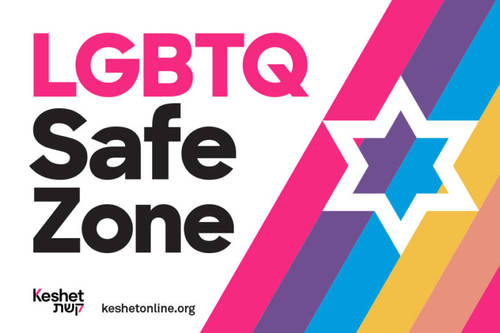Refugee Profiles
Nisreen Ibrahim
04/13/2017 10:17:19 AM
| Author | |
| Date Added |
By Eric Futterman
On the second night of Passover 2017, in the large basement dining hall of a Richmond, Virginia synagogue, 200 people—Jews, Muslims and Christians—waged peace.
Gathered around dozens of tables filled with a cornucopia of food and wine and adorned with the symbolic dishes that define the Passover Seder, Temple Beth-El’s Rabbi Michael Knopf commenced this most unusual Seder by imploring everyone there to “imagine ourselves as though we personally went forth from Egypt…to experience being victimized because of who we are.”
As he spoke hundreds of eyes turned to the 50 people scattered around those tables who did not need to imagine such an experience. Until the last few months, they have been living it.
These refugees from Syria, Iraq and Afghanistan were part of an endeavor by Rabbi Knopf, the non-profit organization ReEstablish Richmond, and the Temple Israel Congregation to help these victims of violence and chaos settle into Richmond and become a part of the tapestry of American society.
During a break in the Seder two of these refugees stood and spoke before this large group; telling of their own exodus from war, famine, and unimaginable violence.
One of the women who spoke was 32-year-old Nisreen Ibrahim. She spoke haltingly, with tears streaming, of how her father, a Sunni, was gunned down in his car in 2007 by Shiite militia, as part of the civil war that erupted following the 2003 U.S. invasion of Iraq. Sunnis and Shiites have been in conflict since the death of the Prophet Muhammad in 632 AD over the leadership and direction of the Muslim faith.
Nisreen has been in the U.S. since late 2016. She works at Staples and was studying to be an engineer in Iraq. Two wars and violence at every turn led her to escape.
I spoke with Nisreen two weeks before the Seder to learn about her story and her experience escaping violence in Iraq, then Syria and Turkey before gaining a visa to the United States. What she has seen with her own eyes is something most Americans could not begin to imagine.
“ISIS, al Qaeda…all of them, I've seen them. They've killed people in front of me, actually. So I saw them. When I was in Iraq and Syria and Turkey too, actually. They take their religion in the bad way. I don't know why. Religion is not a reason to kill people.”
When she left Iraq for Syria, Nisreen arrived as Syrian President Bashar Al-Assad was escalating the war there; creating chaos and abject fear. Where were the next bombs going to be dropped? Whose bodies would be torn apart by these powerful weapons of war?
“Actually I've seen the bombs come from the sky. Came from the helicopters and my God, in the place where I lived, there's 270 people killed in just one hour. And I wait, actually I wait then, I said maybe they kill me too. They just go to the houses and take the men to the street and kill them, just like that.”
|
What is remarkable about Nisreen, a tall, confident woman making her way in yet another country, is how all the violence and extremism has not swayed her from her love of humanity. She even finds it in her heart to love so many of the people who gunned down her friends and family. Echoing Martin Luther King Jr.’s sentiment Nisreen says, “I actually I see the personality of the human being, not their religion or from where they are, or their color.” And that was the point of this particular Seder. Jews learned about Muslims and how people bastardizing their religion resort to horrific violence. Muslims learned of a beautiful Jewish tradition, the Passover Seder, and how the holiday commemorates the life of a people on the run from hatred and violence; all while sampling both the sour and sweet tastes of the Passover menu that symbolizes enslavement and escape to freedom. They listened politely and enjoyed the equally sweet voice of Hazzan Marian Turk as she sang prayers leading into the celebratory meal. At one point, Rabbi Knopf asked everyone who could cite stories of ancestors escaping persecution to stand. Nearly everyone, Jew, Muslim and Christian, stood up; thinking of a grandparent or uncle or even a parent, who came here, tired, desperate and seeking refuge. “I love it,” Nisreen says with a smile that reveals the feeling that she is finally free. “I think when we set dishes together, it's just like there's peace and a lovely atmosphere. I like this because we communicate with each other just because we are human beings, not, I'm Muslim, your Jewish.” And with this particular Passover Seder, the Jewish community of Richmond, Virginia dropped a pebble of peace in the water of humanity. With hugs and handshakes and smiles, that peace has now begun to spread throughout our community. |
Jalal
03/22/2017 04:37:23 PM
| Author | |
| Date Added |
By Eric Futterman
When 32-year-old Abdul Jalal Hashimi walks into a crowded Henrico coffee shop on a brisk Saturday afternoon, it would be easy to mistake him for a typical millennial professional; like an analyst at Capital One. Jalal wears stylish, casual clothes, is meticulously groomed and has the requisite smart phone in tow.
No one in this bustling coffee shop would guess that two years ago Jalal and his wife and children were in danger of being tortured and brutally murdered by the Taliban.
He grew up in Kabul in close proximity to the horrors being inflicted on the Afghan people by the Taliban in the years leading up to September 11, 2001. After the attack, when the United States and its Allies went after the Taliban, Jalal worked alongside American officials there. His work, which he is not at liberty to describe, led to the arrest of Taliban fighters.
“We supported (the) American government and their mission in Afghanistan. I worked more than six years with the American forces. There was a program, which was approved by Congress of the United States of America, to provide special visas for those who supported America's mission there in Afghanistan. I applied for that visa because my life and my family's lives were in danger. We were threatened too many times that, "Hey, you are supporting and you're spying for Americans. That's why you will be beheaded, and you will be killed. Your family will be kidnapped if you continue to support them."
Jalal (the name he likes to be called) is a skilled translator and speaks English quite well. It is quite clear when he talks about the dangers the Taliban and what he calls Daesh (and what we know as ISIS), cause for innocent people in the region. Jalal is even more clear when he describes the enormous gap between his worship of the Muslim faith and that of the Taliban and ISIS.
We spoke just days after ISIS fighters stormed a military hospital in Kabul, killing at least 30 people and wounding 50.
“I want people of the world to know about this. The Taliban and their action and the DAESH or the ISIL and their action, that is not completely in Islam. I'm a Muslim, and I practice Islam, my religion. They do not practice any piece of Islam, and nowhere in the Koran says to kill a person."
Jalal loves being in the US despite his daily concerns about family members still living in Afghanistan. Living as a Muslim refugee in the United States is oftentimes a balancing act. On one hand Jalal is grateful for the work, the people he’s met and the opportunities that exist for his family. Still it’s impossible to glance at the news on any given day and hear of the animosity that exists in many areas of the country toward anyone from the Muslim faith.
He goes back to the Koran to dispel those stereotypes.
“It says if you kill a person, it means you kill all of humanity. And it says if you save a person, it means you save all of humanity. So where in Koran can you find to slaughter a person or a human being? Because in most verse of Koran, when God says or points to Muhammad, peace be upon him, it says 'a people.' It doesn't say 'a Muslim,' it says 'a people.' It is for all humanity.”
I met Jalal through Reestablish Richmond, a non-profit organization that helps refugees to the United States settle in communities and find everything from work to furniture to transportation.
Reestablish Richmond is also working with Temple Beth-El to host Jalal and more than two dozen other refugees at a Seder on the second night of Passover. The Seder and other outreach programs promoted by Rabbi Michael Knopf, Hazzan Marian Turk and religious leaders from both Christian and Muslim congregations, are designed to replace stereotypes of differing cultures and faiths with the faces, voices and personalities of human beings.
For Jalal, who has had very little contact with Jews throughout his life, the Seder is an experience he welcomes as he faces hatred and bigotry that can be born of false stereotypes.
“Since it is a gathering of different people from the very major religions, which is Jewish, Christians, and Muslim or Islam. It would be fantastic. “…what I hope is to know each other. The Jewish and Christian people should know that Muslims are not the terrorists. They are peaceful people. In the same way, Muslims should know the Jewish are not the bad people. The same way, the Muslim shouldn't think that Christians are the enemy of Muslim, because this is a wrong mentality which will inject it to people's mind that Christians are the enemy of Muslims.”
On the second night of Passover Jalal Hashimi, his fellow refugees and a host of American Jews will gather, enjoy a beautiful ritual that encompasses the story that all three major religions can claim, and one bite at a time, begin erasing the stereotypes and eliminating the bigotry that has left so many Jews, Muslims and Christians suffering and on the run.
“That's why that event will help people to understand each other.”
Click here for information on the Refugee Community Seder.
Tue, April 22 2025
24 Nisan 5785
Schedule of Services
Shabbat
Fridays 6:00 pm at 3330 Grove Ave.
Saturdays 10:00 am at 3330 Grove Ave.
Minyan
Sundays 9:00 am at 601 N. Parham Rd (when school is in session, otherwise at 3330 Grove Ave. in the Okun Chapel)
Monday through Thursday 5:45 pm at 3330 Grove Ave. (Okun Chapel)
Virtual Option
All Shabbat and Holiday services are no longer on Zoom, but continue to stream live on Youtube:
Minyan Services remain on the original Zoom link:
https://zoom.us/j/6447146026
Meeting ID: 644 714 6026
Subscribe
Temple Beth-El receives a percentage of sales at Kosher Wine when you use this link, or if you've ordered within 7 days you can go to www.kosherwine.com/give-back and apply our charity code: 8383530
|
Temple Beth-El 3330 Grove Ave. Phone 804-355-3564
Jacob & Selma Brown Religious School 601 N. Parham Rd
|
|||
| Temple Beth-El
|
|||
Privacy Settings | Privacy Policy | Member Terms
©2025 All rights reserved. Find out more about ShulCloud





